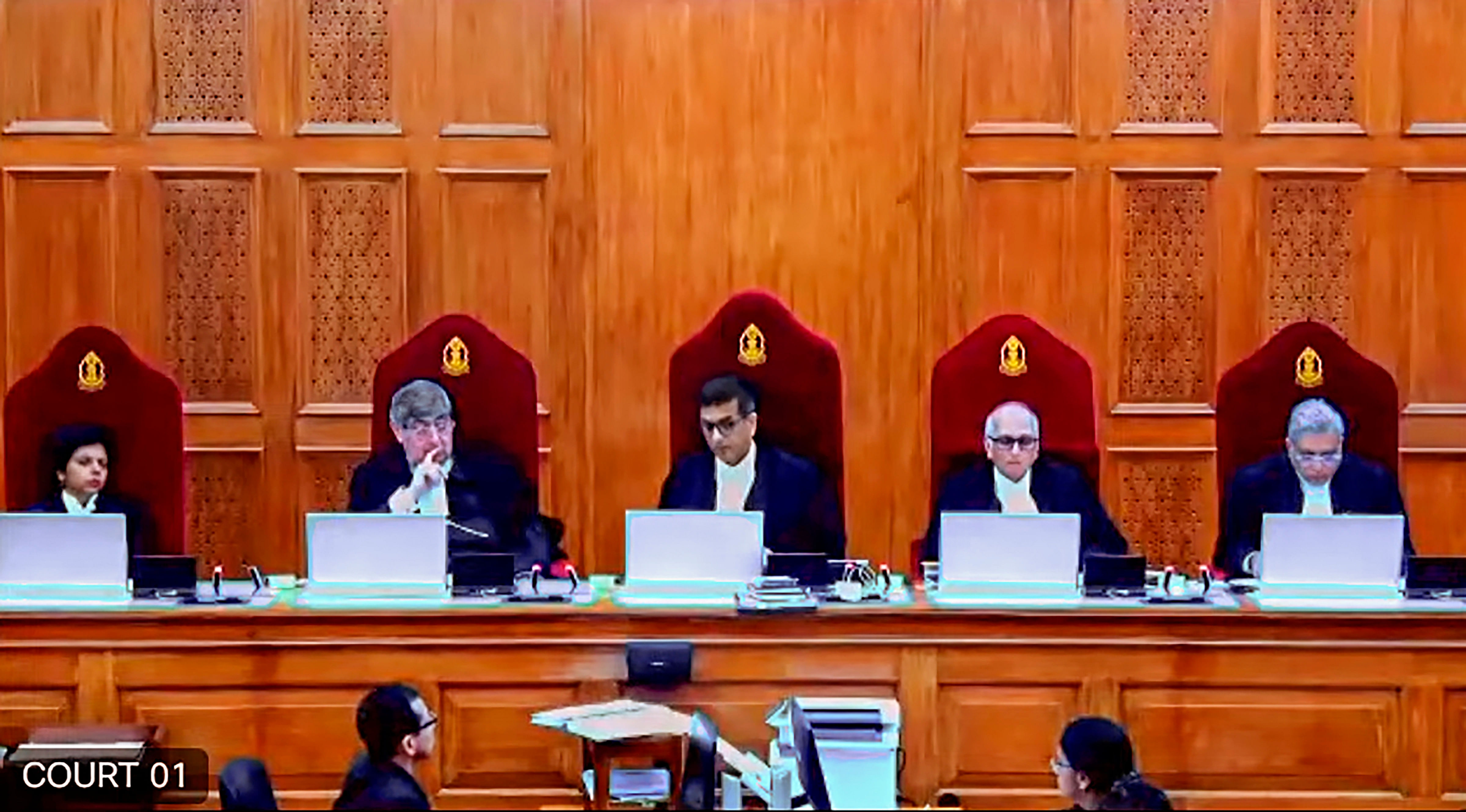
The five-judge Constitution bench comprising Chief Justice DY Chandrachud and Justices SK Kaul, SR Bhat, Hima Kohli and PS Narasimha during the pronouncement of verdict on same-sex marriages, in New Delhi.
Credit: PTI Photo
The Supreme Court on Tuesday declined to grant legal recognition to the marriage of the same sex couples, even though it upheld their right to cohabitation without any threat to violence, coercion or interference.
A five-bench Constitution bench led by Chief Justice of India D Y Chandrachud unanimously held that the court cannot strike down and read down provisions of the Special Marriage Act which recognised the right of only a man and a woman to enter matrimonial alliance.
All the judges on the bench concurred that homosexuality was neither an urban nor elitist concept, but they differed on whether the court can obligate the state to formally recognise the relationship of queer couples by giving it the legal status of a “civil union” or “marriage”.
The CJI and Justice Sanjay Kishan Kaul, for their part, declared that the freedom of all persons, including the queer couples to enter union is protected by Constitution and the State is under an obligation to recognise such union and grant them bouquet of benefits.
However, three other junior judges on the bench sounded a discordant note on the issue.
Justice Chandrachud declared the freedom of all persons including queer couples to enter into a union is protected by Part III of the Constitution, even as he held that there is no fundamental right to marry.
"The right to enter into a union cannot be restricted based on sexual orientation. Such a restriction will be violative of Article 15 of the Constitution. Thus, this freedom is available to all persons regardless of gender identity and sexual orientation," the CJI wrote in his separate judgement.
Agreeing to the CJI's views, Justice Kaul wrote in his own judgement, "Non-heterosexual unions and heterosexual unions/marriages ought to be considered as two sides of the same coin, both in terms of recognition and consequential benefits".
Both the CJI and Justice Kaul recognised the right of the queer couples to adoption but the three other judges on the bench upheld regulations of the Central Adoption Regulation Authority which barred same sex or unmarried couples from jointly adopting a child.
Other judges on the bench -- Justices S Ravindra Bhat, alongwith Hima Kohli and Justice P S Narasimha -- disagreed with the opinions of the CJI and Justice Kaul on the right to civil unions or marriage of the queer couples.
"We do not agree with the CJI who has underlined that the positive postulate of various rights, leads to the conclusion that all persons (including two consenting adult queer persons) have an entitlement to enter into a union, or an abiding cohabitational relationship which the state is under an obligation to recognize, “to give real meaning” to the right," Justice Bhat said in his judgement on behalf of himself and Justice Kohli.
He also pointed out there is no such recorded instance where the court was asked to facilitate the creation of a social institution like in the present case.
In his separate decision, Justice P S Narasimha also disagreed with the CJI and Justice Kaul, saying, "Given this nature of marriage as an institution, the right to choose a spouse and the right of a consenting couple to be recognised within the institution of marriage, cannot but be said to be restricted."
He pointed out the legal regulation of the institution of marriage, as it exists today, involved regulation of the solemnisation or ceremony of marriage, the choice of the partner, the number of partners, the qualifying age of marriage despite having attained majority, conduct within the marriage and conditions for exit from the marriage.
He said the marriage laws do not stand in isolation, they interact in multifarious ways with succession, inheritance and adoption laws, to name a few.
The content of the right claimed by the petitioners is such that it clearly places positive legislative obligations on the State, and therefore, cannot be acceded to, he said, adding there cannot be a mandamus to amend or enact laws.
"A right to a civil union or an abiding cohabitational relationship conferring a legally enforceable status cannot be situated within Part III of the Constitution of India. On this count too, I agree with the conclusions of Justice Bhat," Justice Narasimha wrote.
The court's judgements came on a batch of 21 petitions filed by same sex couples as well as individuals to declare such provisions of the Special Marriage Act as unconstitutional, which recognised the right of only a man and a woman of marriage.
